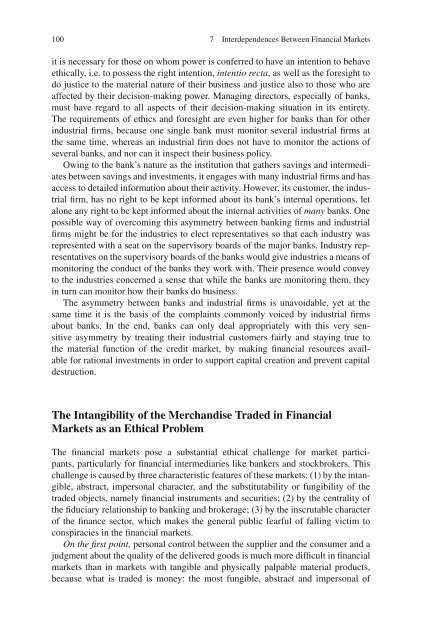The Ethics of Banking: Conclusions from the Financial Crisis (Issues ...
The Ethics of Banking: Conclusions from the Financial Crisis (Issues ...
The Ethics of Banking: Conclusions from the Financial Crisis (Issues ...
You also want an ePaper? Increase the reach of your titles
YUMPU automatically turns print PDFs into web optimized ePapers that Google loves.
100 7 Interdependences Between <strong>Financial</strong> Markets<br />
it is necessary for those on whom power is conferred to have an intention to behave<br />
ethically, i.e. to possess <strong>the</strong> right intention, intentio recta, as well as <strong>the</strong> foresight to<br />
do justice to <strong>the</strong> material nature <strong>of</strong> <strong>the</strong>ir business and justice also to those who are<br />
affected by <strong>the</strong>ir decision-making power. Managing directors, especially <strong>of</strong> banks,<br />
must have regard to all aspects <strong>of</strong> <strong>the</strong>ir decision-making situation in its entirety.<br />
<strong>The</strong> requirements <strong>of</strong> ethics and foresight are even higher for banks than for o<strong>the</strong>r<br />
industrial firms, because one single bank must monitor several industrial firms at<br />
<strong>the</strong> same time, whereas an industrial firm does not have to monitor <strong>the</strong> actions <strong>of</strong><br />
several banks, and nor can it inspect <strong>the</strong>ir business policy.<br />
Owing to <strong>the</strong> bank’s nature as <strong>the</strong> institution that ga<strong>the</strong>rs savings and intermediates<br />
between savings and investments, it engages with many industrial firms and has<br />
access to detailed information about <strong>the</strong>ir activity. However, its customer, <strong>the</strong> industrial<br />
firm, has no right to be kept informed about its bank’s internal operations, let<br />
alone any right to be kept informed about <strong>the</strong> internal activities <strong>of</strong> many banks. One<br />
possible way <strong>of</strong> overcoming this asymmetry between banking firms and industrial<br />
firms might be for <strong>the</strong> industries to elect representatives so that each industry was<br />
represented with a seat on <strong>the</strong> supervisory boards <strong>of</strong> <strong>the</strong> major banks. Industry representatives<br />
on <strong>the</strong> supervisory boards <strong>of</strong> <strong>the</strong> banks would give industries a means <strong>of</strong><br />
monitoring <strong>the</strong> conduct <strong>of</strong> <strong>the</strong> banks <strong>the</strong>y work with. <strong>The</strong>ir presence would convey<br />
to <strong>the</strong> industries concerned a sense that while <strong>the</strong> banks are monitoring <strong>the</strong>m, <strong>the</strong>y<br />
in turn can monitor how <strong>the</strong>ir banks do business.<br />
<strong>The</strong> asymmetry between banks and industrial firms is unavoidable, yet at <strong>the</strong><br />
same time it is <strong>the</strong> basis <strong>of</strong> <strong>the</strong> complaints commonly voiced by industrial firms<br />
about banks. In <strong>the</strong> end, banks can only deal appropriately with this very sensitive<br />
asymmetry by treating <strong>the</strong>ir industrial customers fairly and staying true to<br />
<strong>the</strong> material function <strong>of</strong> <strong>the</strong> credit market, by making financial resources available<br />
for rational investments in order to support capital creation and prevent capital<br />
destruction.<br />
<strong>The</strong> Intangibility <strong>of</strong> <strong>the</strong> Merchandise Traded in <strong>Financial</strong><br />
Markets as an Ethical Problem<br />
<strong>The</strong> financial markets pose a substantial ethical challenge for market participants,<br />
particularly for financial intermediaries like bankers and stockbrokers. This<br />
challenge is caused by three characteristic features <strong>of</strong> <strong>the</strong>se markets: (1) by <strong>the</strong> intangible,<br />
abstract, impersonal character, and <strong>the</strong> substitutability or fungibility <strong>of</strong> <strong>the</strong><br />
traded objects, namely financial instruments and securities; (2) by <strong>the</strong> centrality <strong>of</strong><br />
<strong>the</strong> fiduciary relationship to banking and brokerage; (3) by <strong>the</strong> inscrutable character<br />
<strong>of</strong> <strong>the</strong> finance sector, which makes <strong>the</strong> general public fearful <strong>of</strong> falling victim to<br />
conspiracies in <strong>the</strong> financial markets.<br />
On <strong>the</strong> first point, personal control between <strong>the</strong> supplier and <strong>the</strong> consumer and a<br />
judgment about <strong>the</strong> quality <strong>of</strong> <strong>the</strong> delivered goods is much more difficult in financial<br />
markets than in markets with tangible and physically palpable material products,<br />
because what is traded is money: <strong>the</strong> most fungible, abstract and impersonal <strong>of</strong>

















